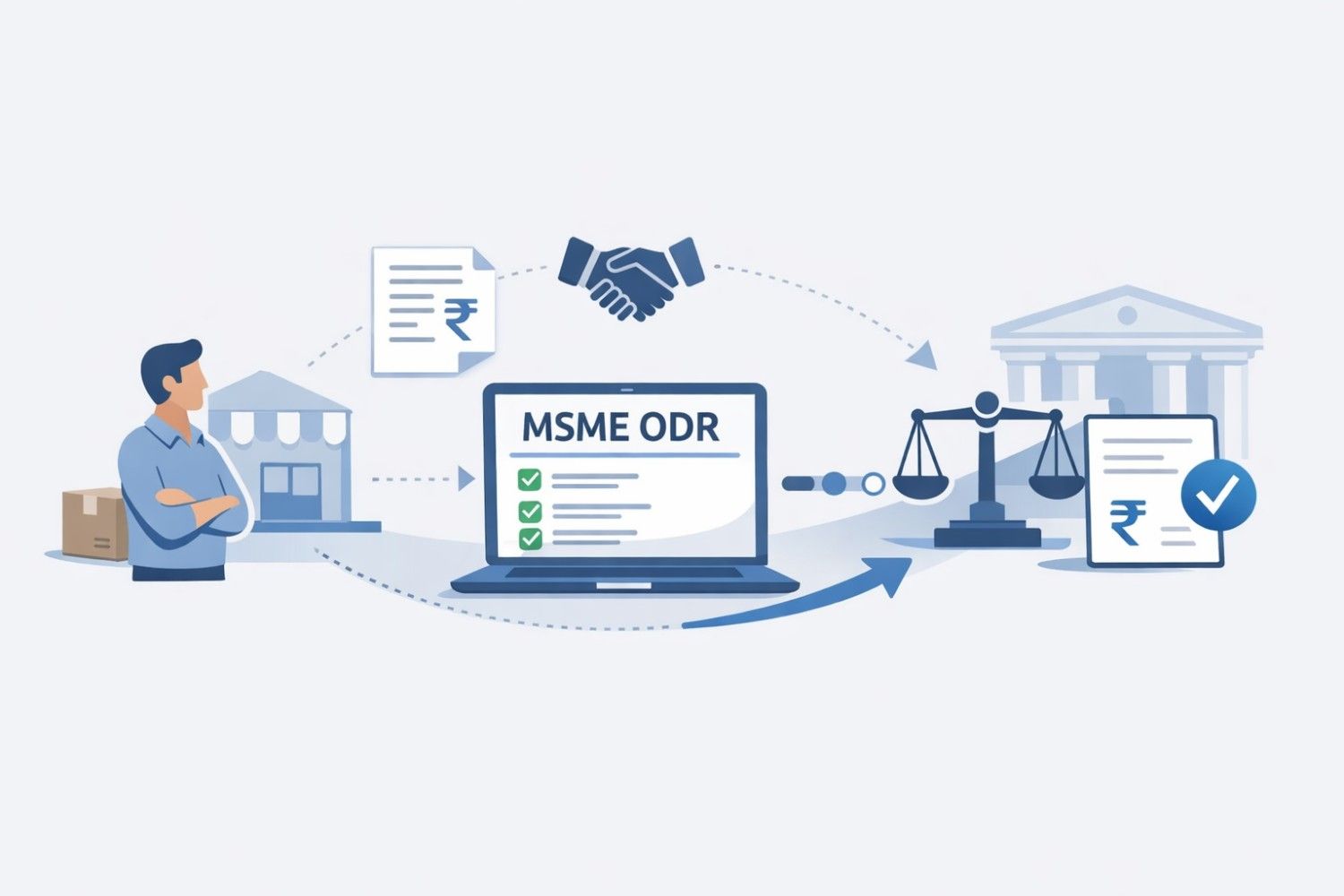HOW TO SEND A LEGAL NOTICE FOR NON-PAYMENT IN INDIA
By the SolvLegal Team
Published on: Oct. 14, 2025, 5:21 p.m.

INTRODUCTION
When someone owes you money and simply refuses to pay, frustration is natural. But before you rush to court, the first and most powerful legal step is to send a formal legal notice for non-payment.
A well-drafted notice is more than just paperwork it’s a legal trigger. It formally communicates that you’re serious about recovering your dues, and it often prompts repayment without litigation. In fact, many recovery suits are resolved immediately after a notice is served.
Need to send a notice now?
Download our free Legal Notice for Non-Payment Template or get it drafted and served by a lawyer through SolvLegal’s Quick Legal Services.
LEGAL BASIS: WHAT LAW SAYS ABOUT PAYMENT DEFAULTS
In India, sending a legal notice for unpaid dues derives support from multiple legal provisions:
Indian Contract Act, 1872: When one party breaches a payment obligation, the other can claim damages or recover money under Sections 73 and 74.
Negotiable Instruments Act, 1881: Under Section 138, a 15-day notice is mandatory in cheque bounce cases before filing a complaint.
Code of Civil Procedure, 1908: Section 80 requires a 2-month notice before suing the Government or public officials.
Limitation Act, 1963: Generally, a recovery claim must be made within 3 years of the date the payment became due.
Courts have repeatedly underscored the value of a notice. In C.C. Alavi Haji v. Palapetty Muhammed (2007), the Supreme Court held that refusal to accept a legal notice still counts as valid service meaning the debtor cannot escape by ignoring or refusing delivery.
WHEN SHOULD YOU SEND A LEGAL NOTICE?
A legal notice for non-payment can be sent whenever a financial or contractual obligation remains unfulfilled. It serves as a formal reminder to the other party that the matter is being taken seriously and that legal action may follow if payment is not made within a reasonable time.
Some of the most common situations include:
· Default in payment by a client, tenant, or customer despite prior reminders or agreed timelines.
· Completion of contractual obligations - such as delivery of goods or provision of services - without corresponding payment from the other side.
· Dishonoured cheques, unpaid invoices, or credit defaults where informal requests have failed to yield results.
· Repeated delays or avoidance in clearing legitimate dues, suggesting an intention to evade payment.
Sending a legal notice in such cases is a professional and legally recognized first step. It not only reinforces the seriousness of the claim but also provides the recipient one final opportunity to settle the matter amicably - often avoiding the need for costly court proceedings.
ESSENTIAL COMPONENTS OF A STRONG LEGAL NOTICE
1. Details of Both Parties
Start by clearly mentioning who is sending the notice and who it is being sent to and it should include:
· Full legal names,
· Addresses (both residential and business), and
· Contact information.
This might sound basic, but incorrect or incomplete details can make the notice invalid or delay proceedings later.
2. Facts of the Case
Lay out the background of the transaction in a clear timeline:
· When did the deal or agreement take place?
· What was promised or delivered?
· What exactly remains unpaid?
3. Explain the Legal Basis for Your Claim
When describing the case, everything has to be kept straightforward and factual. Think of it like telling a timeline what happened, when it happened, and what remains unpaid. Instead of assigning blame or using emotional language, focus on evidence such as invoice numbers, payment dates, delivery receipts, or email reminders.
Every strong legal notice should show why the aggrieved person is entitled to demand payment not just that the he wants it.
Briefly mentioning the legal grounds supporting the claim. This could be like:
· A breach of contract under the Indian Contract Act, 1872 particularly Sections 73 and 74, which allow you to claim damages for non-payment.
· A dishonoured cheque situation covered under Section 138 of the Negotiable Instruments Act, 1881.
· Or even a specific clause from your written agreement that clearly spells out the payment terms or penalties for default.
There is no need to write like a statute book, just stating the relevant provision in simple terms is enough.
For example:
“Your failure to make payment constitutes a breach under Section 73 of the Indian Contract Act, 1872, entitling my client to recover the amount along with applicable damages.”
Hence, mentioning the legal basis makes the notice look well-prepared, credible, and enforceable it tells the other side that you know your rights and are prepared to assert them properly.
4. Specify the Amount Claimed
After setting out the facts and the legal foundation, the notice must clearly state the amount due.
The claim should be precise, supported by documents, and leave no room for ambiguity. Vague phrases like “please clear all dues” should be avoided.
For instance:
“The recipient is required to remit ₹1,75,000 (Rupees One Lakh Seventy-Five Thousand only) being the outstanding amount under Invoice No. 14 dated 12 August 2024.”
If interest, late payment charges, or other costs are claimed, those should be specified along with the applicable rate and period.
Accuracy in figures and references ensures the notice appears credible, well-prepared, and supported by evidence.
5. Include a Reasonable Timeline for Compliance
An effective legal notice always sets a definite time frame for the recipient to act.
This demonstrates fairness and gives one final opportunity to resolve the matter amicably before litigation.
Typically, a period of 7 to 30 days is provided depending on the circumstances:
· In cheque-bounce cases under Section 138 of the Negotiable Instruments Act, 1881, a statutory period of 15 days applies.
· For contractual dues or general payment defaults, 30 days is customary.
Mentioning a specific date or number of days lends clarity and structure, establishing the seriousness of the demand and the consequence of non-compliance.
6. Outline the Consequences of Non-Payment
A legal notice should not merely demand payment; it should also make the next steps clear if the demand is ignored.
This portion should remain professional and factual, explaining the legal course that may follow.
Example:
“Failure to remit payment within 15 days of receipt of this notice shall result in initiation of appropriate legal proceedings at the recipient’s cost and responsibility.”
Such language avoids hostility while firmly communicating the gravity of non-compliance, often prompting faster responses or settlements.
7. Conclude with Proper Authentication
Every notice should conclude with formal authentication through signature and identifying details. When issued by an advocate, it should appear on official letterhead bearing the advocate’s name, address, and enrolment number.
If issued directly by a party, it should include the sender’s full name, address, and contact information. A properly signed and dated notice reflects professionalism and authenticity. It also serves as valid evidence that the document was issued by an authorized person, strengthening its enforceability in any subsequent proceedings.
For legally vetted and professionally served notices, explore SolvLegal’s Quick Legal Services for drafting, review, and delivery assistance.
ABOUT THE AUTHOR
This blog is authored by Shridansh Tripathi, a second-year law student at the Department of Legal Studies and Research, Barkatullah University, Bhopal.
REVIEWED BY
This blog was reviewed by Rakshika Bajpai, a corporate lawyer specialising in IPR, contract drafting, and compliance advisory. She is a technology-driven legal professional focusing on corporate compliance and data-privacy frameworks at SolvLegal. Her work spans IT law and cross-border regulatory matters, and she supports businesses in protecting their innovations and strengthening their legal and compliance structures.
Read our other blog on Trademark Cease and Desist Notice:
Go through our Notice Drafting Services:
https://solvlegal.com/legal-services/legal-notice-opinion-advisory/legal-notice/
DISCLAIMER
The information provided in this article is for general educational purposes and does not constitute legal advice. Readers are encouraged to seek professional counsel before acting on any information herein. SolvLegal and the author disclaims any liability arising from reliance on this content.





